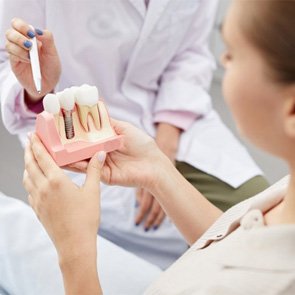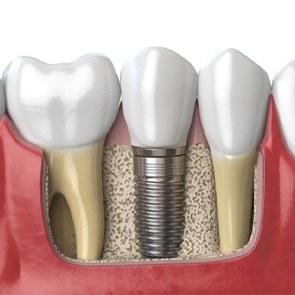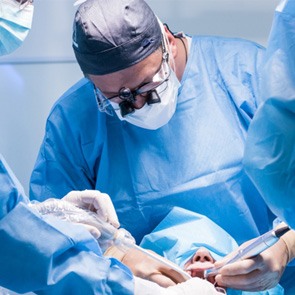Dental Implants – Tulsa, OK
Comprehensive Replacement Teeth for a Healthy Smile
Various circumstances could lead to the loss of a tooth or teeth. Whatever the cause, the replacement of a lost tooth is extremely important. Even a single missing tooth can impact not just your confidence, but also your oral health. Gaps between teeth may result in a shift that could throw off the bite as well as the appearance of teeth. This extra space allows bacteria to thrive, leading to an increased risk of tooth decay, gum disease, and potentially serious health conditions. Replacing missing teeth with dental implants in Tulsa offers a permanent solution with great benefits.
Why Choose Glisten Dental Care of Tulsa for Dental Implants?
- Start-to-Finish Dental Implant Treatment
- Natural Looking & Feeling Replacement Teeth
- Compassionate Dentist and Team That Listens
What Are Dental Implants?

Dental implants, which have been successfully used for many years, replace not only a lost tooth but also, the entire root system. This is achieved through the implantation of a titanium post into the jawbone, which Dr. Hammond is specially trained to do in-office. It does take several months after this initial procedure for the jawbone to heal around the implant post, but the function and aesthetics that come from dental implants last a lifetime and don’t require alteration of your surrounding, healthy teeth.
The 4-Step Dental Implant Process

Dental implants are incredibly comprehensive and lifelike, requiring multiple steps in the process to ensure a complete and long-lasting solution for tooth loss. While the treatment might take several months to finish, you can typically expect results to last decades to a lifetime with proper care. Before then, here are the four main stages involved in the dental implant process.
Initial Dental Implant Consultation

The first step of every dental implant treatment that we complete is a consultation with Dr. Hammond. She’ll speak with you about your oral/medical health history and smile goals, and then she’ll conduct a thorough evaluation of your mouth to outline what the treatment will look like for your unique situation. Based on this, you can decide whether you want to move forward with the dental implant process.
Our team will also need to assess your oral health to ensure you’re free of any growing complications that could risk implant failure, such as decay and infection. If necessary, we can provide preliminary services to get you prepared for the procedure, such as gum disease treatment, bone grafting, and tooth extractions. Once you’re ready, we can begin your surgery.
Dental Implant Surgery

When you consent to the treatment plan, our team will schedule your surgery, which will be completed in-house by Dr. Hammond. She’ll place the implants beneath the gumline and into the jawbone to provide a strong foundation for your replacement teeth to be attached to. Of course, our team will also administer a local anesthetic to keep your mouth pain-free before beginning the procedure. We can also provide various sedation dentistry options to increase your comfort so that you can relax during your appointment. After your implants have been embedded in your jawbone, we’ll suture your gums closed and then place dental caps on top to keep them protected while your mouth heals.
Dental Implant Osseointegration & Abutment

Following your surgery, it will take anywhere from three to six months for osseointegration to occur, which is when your implants naturally fuse with your jawbone. If healed properly, this will form the stable foundation for your future restoration(s), allowing them to remain in your mouth indefinitely whenever you eat or speak. After this is completed, we can secure small metal connector pieces to them called abutments.
Delivery of Dental Implant Restoration(s)

Once your permanent restoration is crafted by our dental laboratory and your gums have healed from the placement of your abutments, we’ll call you back in to attach your replacement teeth and complete your smile. After we’ve fitted your custom dental crown, bridge, or denture to your mouth, we’ll double-check that your bite is correct and that you’re happy with the results before sending you on your way.
Benefits of Dental Implants

If you haven’t already heard, dental implants are popular as tooth replacements. They’re so loved that dentists place roughly 500,000 of them yearly! You see, implants have a rather unique placement method. Since they fit directly in the jaw, they offer many perks that dentures and bridges can’t match. As a result, they’ll greatly improve a patient’s overall quality of life. To learn about the benefits of implants, just keep reading or call our office.
Day-to-Day Benefits

After treatment, you’ll quickly notice implants’ day-to-day upsides. These include:
- Pretty Results – Since they’re capped with dental crowns, implants are beautiful and blend seamlessly with adjacent teeth. In fact, they’re so lifelike that friends and family won’t notice their artificiality.
- High Confidence – By filling your unseemly smile gaps, implants will boost your confidence. As a result, you’ll feel less anxious and more self-assured.
- Easier Eating – Implants restore your bite force when they fuse with your jaw. As such, they’ll help you chew your favorite tough foods!
- Simple Care – Implants don’t need special care, especially when compared to dentures and bridges. Patients can maintain them like natural teeth. Put another way, you must brush them twice daily, floss between them once daily, and rinse them often with mouthwash.
Health Benefits

Over time, implants confer health advantages as well. The most common ones are:
- Stronger Jawbone – Left unchecked, tooth loss will erode your jawbone. (This process will then trigger facial collapse.) However, implants can prevent and reverse this erosion. They’d stimulate your jaw to preserve its bone tissue.
- Better Nutrition – Once they restore your bite force, implants allow you to eat a wider range of foods. This expansion in dietary choices leads to improved nutritional health.
- Smile Support – Truthfully, smile gaps tilt your surrounding teeth. These tilted chompers could then fall out. When implants fill the spaces, though, your other pearly whites are kept straight.
- Fewer Oral Risks – If your jaw sockets are empty, they’ll become breeding grounds for harmful bacteria. Luckily, implants can fill these gaps and thus reduce your risk of oral issues (gum disease, infections, etc.)
Long-term Benefits

Of course, what really helps implants stand apart are their long-term benefits. These are the following:
- Great Success – So long as they’re placed by a qualified dentist, implants usually succeed in the long run. It’s to the point that their ten-year success rate is about 95%!
- Longevity – A dental implant lasts an average of 15-20 years. When well-maintained, though, it can reach a lifespan of 30 years or more. Either way, these numbers show an implant could help you for a lifetime.
- Cost-Effectiveness – While they can look pricey at first, implants save you money in the long run. Unlike dentures or bridges, they don’t need many replacement or repair visits. That means they can be the most cost-effective restorations.
Who Dental Implants Can Help

The type of restoration that you need will directly depend on the number of teeth that you’re missing. Dental implants can be used to replace one tooth, multiple teeth, or even entire smiles.
Missing Single Tooth

If you’re missing just one tooth, it’s still important to replace it. An implant-supported dental crown can seamlessly complete your smile. We custom-craft our dental crowns out of high-quality ceramic to provide you with a strong and beautiful restoration.
Missing Multiple Teeth

Are you missing multiple teeth in a row? We may recommend an implant bridge. This personalized prosthetic literally “bridges” the gap in your smile to create a stable and natural-looking replacement.
Missing All Teeth

If you’re missing all of your teeth, an implant denture is your best option. Combining the best of both worlds, this option allows us to replace your smile all at once, with the stability and health benefits of dental implants.
Learn More About All-On-4 Dental Implants
Understanding the Cost of Dental Implants

The cost of your dental implants will vary depending on a few factors that are specific to your smile, which is why it’s hard to give an estimate without examining your mouth first. The number of teeth that you’re missing, the condition of your overall health, and the strength of your jawbone are the main variables that influence the cost. Also, the type of restoration that you need must be accounted for in addition to the implants themselves. At Glisten Dental Care of Tulsa, we accept insurance and have flexible dental financing to give you quality, affordable dental care.
Dental Implant Post-Op Instructions

Once implant surgery is over, you’ll need to recover. Rest assured, though, that there’s no need to worry about this process. We at Glisten Dental will help you through it all! To that end, listed below are crucial dental implant post-op instructions. These points will tell you what to expect, typical recovery symptoms, and how to help your smile heal. However, please call us if you face intense pain or strange side effects not mentioned here.
What to Do Directly After Dental Implant Surgery

After implant surgery, your main task is to leave the forming blood clot alone. (You won’t heal well from treatment otherwise.) Given that fact, make sure to follow these rules:
- Don’t spit. Instead, swallow your saliva or use a tissue for dabbing.
- Don’t use drinking straws. Their suction force might dislodge your blood clot.
- Don’t smoke on the first day after surgery.
- Keep your fingers and tongue away from the surgical site(s).
Common Side Effects When Recovering from Dental Implant Placement

Following implant placement, you’ll likely face some mild side effects. Those that appear may include:
- General Discomfort – Your mouth may ache after the surgery’s anesthesia fades. To manage this soreness, take store-bought pain relievers.
- Intermittent bleeding – Your treatment site(s) might occasionally bleed. If that happens, lessen the effect with gauze and light pressure.
- Gum or Facial Swelling – In the first 72 hours post-surgery, your face and gums could swell a bit. Try using a cold or warm compress to reduce the swelling.
Luckily, these effects are temporary; they’ll subside with time. If that’s ever not the case, please let us know.
Your Diet After Dental Implant Surgery

For a few days after implant surgery, stick to softer and non-abrasive foods. Chewing tougher stuff can interfere with your recovery.
Some softer foods you might like to try are:
- Pasta
- (Non-hot) Soup
- Yogurt
- Scrambled eggs
- Mashed potatoes
- Pudding
- Ice cream
You can resume your typical diet when you feel up to it. Still, we recommend that you limit crunchy and tough foods. You should also not chew directly on the implant site(s).
Post-Op Health & Oral Hygiene

Even as you recover from implant surgery, your mouth still needs regular cleaning. So, remember to practice good oral hygiene; just make some changes to ensure smooth healing.
For example, please brush your teeth as usual. (Twice-daily brushing is always crucial!) However, be gentle when you reach the surgical site. You don’t want to dislodge the blood clot.
Meanwhile, make a slight change to your mouth rinse approach. Using a mouthwash with a high alcohol content will cause issues. Instead, try a twice-daily rinse with saltwater. This alternative will reduce your post-surgery inflammation.
What to Do After Your New Teeth Are Attached

With your new crown, bridge, or denture attached, you shouldn’t have difficulties. Some mild sensitivity may be present, but you can manage this symptom with painkillers. Otherwise, this final placement won’t result in abnormal swelling, bleeding, or extensive recovery. On the contrary, it’ll leave you ready to show your complete smile!
Other Tooth Replacement Options

Dentures are also a form of tooth replacement that cannot compare in the area of stability. Many denture wearers are now making the switch to implant dentures and discovering new-found freedom to eat, speak, smile, and laugh without concern over their prosthetics slipping or falling out. With the stable support of implants, speech is improved, as is diet since there are virtually no food restrictions.
For the replacement of a single tooth or a few teeth, dental implants are a great alternative to partial dentures, which are often removable, harboring the same issues as a fully removable denture. Implants are also superior to a fixed dental bridge, as it is not necessary to reduce healthy teeth in the replacement process.
How much are dental implants from your Tulsa, OK dentist going to benefit you? When you take into account the preservation of jaw structure and facial contours, the restoration of full chewing function and a natural aesthetic, and the ability to smile with confidence, you might realize there is no better way to replace missing teeth than with implants.
Dental Implant Failure & Salvage

While dental implants have an incredible success rate of 95% or more, there’s still a slight chance that they can fail later on. The good news is that our team can provide salvage treatment to preserve your results so that you can continue enjoying your renewed bite. Don’t hesitate to inform us of any changes to your new teeth, and we’ll do everything we can to ensure your implants stay strong and healthy.
Learn More About Dental Implant Failure & Salvage
Dental Implant FAQs
As the only solution to tooth loss that replicates the tooth’s root structure as well as the crown, dental implants in Tulsa offer several unique benefits that alternative treatments, such as traditional dentures and bridges, simply cannot deliver. However, they are considered a major investment. They require oral surgery and generally cost more than other options. To help you become confident in your decision to get dental implants, we’ve answered some questions about them that our team at Glisten Dental Care of Tulsa receives often.
Why do I need a bone graft before getting dental implants?
Dental implants are so successful and long-lasting because of the strong bond they form with your jawbone after they’re placed. However, if your jawbone has lost density, which is common after tooth loss, then there won’t be enough room to accommodate dental implants. In this case, you may require a bone graft before implant placement surgery.
A section of bone tissue (which can be either artificial or taken from elsewhere on your body) can be grafted onto the area of your jawbone where the implants will be placed. It may take a few months for the tissue to fully integrate, but it will be worth the wait to ensure your implants have adequate support to last for years to come.
How do I take care of my dental implants?
You may be surprised to learn that caring for your dental implants doesn’t involve anything you shouldn’t already be doing for your natural teeth. You’ll need to brush and floss your implant restoration daily to prevent plaque buildup. Rinsing with an antibacterial mouthwash can clean out the areas of your mouth that your toothbrush and floss can’t reach. Avoid using tobacco or chewing on hard objects with your implant. Wear a mouthguard during sports and a nightguard if you grind your teeth to protect against injury. Lastly, see us for a dental checkup every six months so we can ensure your implants are still in good condition.
Am I a good candidate for dental implants?
If you’re missing at least one tooth, chances are you’d make a good dental implant candidate. You might just require preparatory work first, like bone grafting or gum disease therapy.
Certain health conditions, such as diabetes or HIV/AIDS, can complicate the procedure and increase your risk of implant failure. However, your implant dentist in Tulsa can discuss ways you can minimize this risk during your consultation.
Will people be able to tell I have dental implants?
Not at all! Each restoration is designed from impressions that we take of your mouth. It will be meticulously crafted in a dental lab to resemble your natural pearly whites. Once it arrives at our office and we’ve placed it onto your implant, it should look just like the rest of your smile. Anyone you meet after you’ve completed the dental implant process shouldn’t be able to notice that you’ve lost any teeth at all!
I Need a Dentist for My Family I Need a Checkup & Cleaning I Have a Cavity or Broken Tooth I am Missing One or More Teeth I Want to Enhance My Smile I Want a Straighter Smile I am in Pain & Need Help I Have Pain in My Jaw I Need a Dentist for My Child I am Scared of the Dentist I am Worried About Bleeding Gums View Our Services
